I’ve been thinking about horses and abandonment recently. By abandonment, I mean a situation where a treasured or most favored horse has suffered an irreparable injury and has suddenly been dropped by the humans who previously lavished attention upon it. It happens quite a bit.
Do the horses know they’ve been abandoned? Yes, I believe so.
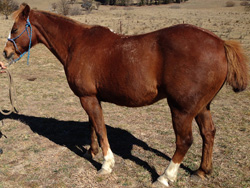 Take this pony, who currently goes by the name of Bob. His conformation speaks of Quarter Horse crossed with Welsh, with the Quarter Horse mainly walking behind the Welsh. Paddock condition doesn’t help on the looks front, as he’s obviously a ‘fat on fresh air’ type. But I’m putting that to one side, as it’s Bob himself that I’m interested in.
Take this pony, who currently goes by the name of Bob. His conformation speaks of Quarter Horse crossed with Welsh, with the Quarter Horse mainly walking behind the Welsh. Paddock condition doesn’t help on the looks front, as he’s obviously a ‘fat on fresh air’ type. But I’m putting that to one side, as it’s Bob himself that I’m interested in.
A power-packed pocket rocket, he’s one of those lovely straightforward guys that makes you smile almost as soon as you meet him. He gives every appearance of having been a true sports pony and, whatever his sport was (barrel racing?), he did it fast. The lad finds it hard to stand still in the paddock – he is wired to move.
And yet, with a damaged knee that tells of an unpleasant accident, he subsequently found himself at the sales.
At some point during this process, his tail was cut off. I somehow doubt that the person responsible did it to make memento jewelry. We have to assume that the hair was sold, as the owner at that time knew the pony was advancing on a one-way trip to the meat man (or to ‘the doggers’, to use Australia’s typically direct term).
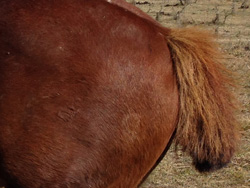
In economic terms, this action could be called ‘asset stripping’ – ie, getting every last cent possible by breaking a possession down and selling the parts. There’s obviously no regard for preservation of the whole or what’s left at the end.
Now, I do realize that once a horse is slaughtered, its remains are subject to asset stripping. Indeed, there’s a company near here that collects tendons for use in research. I also realize that by the time a horse hits the slaughter house floor, its tail will be somewhat less than clean, for a variety of reasons. There are obvious practicalities involved. But what I’m concerned about here is what’s happening to a living horse. So, let’s return to Bob…
Clearly, he hit a remarkable upswing when he was bought from the sales by a good man with plenty of land. Thankfully, the new owner wasn’t concerned about lack of ridability due to the knee injury, and was happy just to watch Bob being a pony in the paddock. If the pony demonstrated that he could carry a toddler along on the lead rein, then that would be great. But if he couldn’t, that was fine too. He wouldn’t be required to earn his keep – he could just be Bob.
At this point, I was asked to come out and give the pony some bodywork, just to see whether it would help make him more comfortable.

Now, during a bodywork session, it’s always apparent to me when a horse has lost its trust in people. I don’t mean a horse with so-called behavioral issues, although there are plenty of those, but a horse that knows its people have given up on it.
Such horses maintain a distance – not necessarily detaching themselves from what is happening, as they can be very physically cooperative. But they don’t come forward in an emotional sense. There’s a reserve that is incongruous to everything else that is going on.
It’s like being with a partner whose mind is partly on the football. Their presence is missing by, ooh let’s say 5-25%, depending on how much they support that team. No way can you not be aware of it! (I’m trying desperately to think of the female partner equivalent and failing at the moment.)
I spent an hour working with this pony and yet he still maintained his not-quite-there reserve. That was the choice that felt best to him at the time, and that was OK with me. So I left, expecting that to be that.
Driving away, I thought more about that crudely chopped tail. The tail that somebody’s hands had once carefully groomed had, ultimately, been roughly removed. I had to wonder whether it was by the same or another pair of hands.
The next day, earlier than expected, I received a phone call from Bob’s owner.
“I went to the paddock today,” he said, “and that pony walked straight up to me for the first time, looking for a fuss. He’s not done that before.”
Now, this is the kind of thing I like to hear. It might sound a small thing, but as the owner recognized, the small thing was significant precisely because it had been absent before. Something important had changed for Bob during the intervening hours.
He felt physically better and had decided that it was OK to trust a person again.
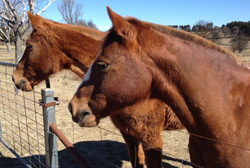
I am so pleased that this outcome transpired for this particular pony. And I am grateful for meeting horses like this, for it’s their beautiful forgiving souls that prevent my anger from rising.
For the truth is that I quietly despise owners who will use such a willing horse or pony up, and then dump their injured animal at the sales, in full knowledge that it is only ever going to be slaughtered at the end of a few stress-inducing weeks or days. Very few share Bob’s luck at this stage.
I am certainly not misguided into thinking that there is a home for every broken and injured horse, or even that all horses can find a home, injured or not. Those who make it to companion or paddock ornament status are incredibly fortunate. And I recognize that not all horses are treated as I treat mine. People own horses for different reasons.
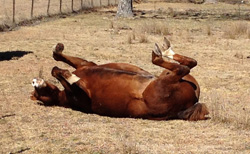 But I have to ask, what price a dignified end? It seems that the attraction of a couple of hundred bucks, symbolized by Bob’s severed tail, is simply too much for their owners to turn away.
But I have to ask, what price a dignified end? It seems that the attraction of a couple of hundred bucks, symbolized by Bob’s severed tail, is simply too much for their owners to turn away.
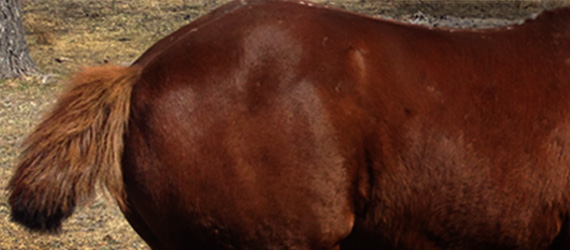
How lucky is Bob, and how unlucky are so many others less fortunate than him. I just cant understand how anyone can just give up an animal cos of injury, but then not everyone is like me! I have a 34 year old diagnosed with ringbone at 13 still hale and hearty in the paddock and basically sound living out her retirement in bliss, with her 28 yr old appy mate who has had several mini strokes!
Mary
Hi Mary, I think you just broke the record for fastest comment written after the article was published!
My feelings are hardly original, and so many of us share the anguish. Most of the time, my feelings are tucked away, so that I can get on with the immediate concern of helping the horse.
But now and then, one jags at me, and this was that one.
How lovely is that, the two together to enjoy their retirement!!! My boy is 23 (May) can NOT even imagine him sent to auction!!! LOVE, LOVE these seniors!
Heartbreaking story, yet heartwarming at the same time!
Bittersweet, isn’t it? I find that I need to be a bit detached when working with horses like this – I give all that I can, and empathize with the horses, but it does nobody any good to take too much on board. The angry person can’t help a horse who needs support from the therapeutic approach. But the tail made me gnash my teeth…
Heartbreakingly true. The pain it causes me to have to make the decision is nothing compared to the guilt of the inevitable pain and uncertainty they would face if I made it someone else’s problem. I guess some people are born without that kind of conscience.
That’s so true. I have only once had to make an elective, rather than an emergency, decision for a horse (due to rapidly advancing joint degeneration) and it was utterly excruciating. 10 days of hell. I was strengthened by the knowledge that I was doing the right thing for her and I still know that to this day. And I think, if I could do that, through all the love and tears, on my own, then why can’t other people?
A wise friend said to me, quite simply, “there are worse things for a horse than death”. With the unpleasant alternative offered to them by so many, I think this holds to be true.
Sometimes the suffering we humans force on ourselves, all the creatures with whom we share space, and on the space we share feels like it is just too much. Why? How can we be inspired to plug in to our connectedness and empathy? The reality makes me sad, and I let myself feel it, and then I work hard (not often successfully) to have empathy, or something other than the desire to inflict violent retribution on all the cruel, careless, heartless acting humans out there. And then I am grateful for people like you, who care so much, and who help horses and others remember we aren’t all awful all the time. And then I send mental postcards out to all the horses less fortunate, less loved, and try to be with them at least in spirit. Because honestly, I don’t know what else to do. Thanks for a great post.
Oh Lucinda. I know what you mean and those thoughts are a sad place to be.
I flash into that area of thought from time to time, but otherwise try to get on with things… I guess we need to make our empathy a productive force for good, rather than a source of pain for ourselves?
Poignantly written. “I quietly despise owners who will use such a willing horse or pony up” quite resonated with me. I’m also a massage therapist and share your experience with horses who have been dumped when their usefulness declines. I personally try to focus on the fact that they are in better hands now, but it’s quite painful to see a horse that was someone’s dream once brought so low. Bob is lucky that he crossed paths with a kind man at the end.
Hi Lisa, yes, I’m with you there. I don’t focus on the history, but aim to be strong (and empathetic) for the horse in the present. I’ve not written ’emotive’ posts before, but this one needed ‘out’, so I let it run.
Oh Jane – I actually felt tears in my eyes reading this. I feel exactly as you do, as I’m sure do so many of your readers. People are heartless and cruel and certain of them have no right having horses or any animals at all. A friend of mine also does bodywork on horses and she has also found how sometimes, even when you don’t see an immediate reaction – (like you felt Bob wasn’t quite “there” and giving of himself, nevertheless, it must have made a difference and relaxed him in spite of himself – which showed later) – the horse is different the next time around! Thank you for sharing this story of Bob, which DID have a happy ending.
Lucille.
Thanks for taking time to comment, Lucille. I appreciate it.
To be honest I’m surprised that it’s moving so many people, as I definitely didn’t aim to write an emotional post as such. I didn’t feel upset for this little fellow, but did carry away a gritty kernel of anger towards the cynical people who effectively condemned him to his fate by cutting off his tail. It really is a signal to any prospective buyer that the horse is fit for nothing but the meat works.
I’ve been around and had horses, for over 30 years and I have to be honest, I never knew about this aspect of cutting a horse’s tail. Perhaps it’s something that differs from country to country? I’m in South Africa and have never been aware of there being monetary gain from their tail hair, but then again, I don’t frequent horse sales! It just seems a horrible, degrading and frankly cruel thing to do, as that is also their means of swishing flies off! Clearly these kind of people don’t care about the bothersome flies, as they’re sending the horse to his/her death!
Thank you for writing this article. You are very talented and it is heartwarming to know that someone would take the time to write about a discarded pony.
By focusing on one pony, it’s possible to say a lot about the plight of so many more. Or rather, to say a lot about a certain kind of owner.
Made me cry. I hope Bob is continuing to improve mentally and physically. I also hope that the person that cut his tail off will one day discover true compassion and understanding and will learn to act differently. There are so many horses and other animals that suffer from the hands of people — sometimes from people that do not even have a clue that they are causing pain.
Yes, he is a lucky one and strikes me as fairly robust character 🙂
Your message hits home to me. After I retired and never having owned a horse before, I decided to provide a sanctuary for horses that nobody wants. Through Internet forums I chose 6 horses from NJ and PA that were slaughter prospects and shipped them to Texas. After a life a service these used up horses’ jobs are to be themselves without stress and to teach me how to manage horses. Because they are old or have special needs, some have not been with me long, and the decision to help them pass has been gutwrenching. However, I am grateful for the privilege of caring for them. ( I have 16 animals at this point. ) The concept of squeezing the last tiny bit of market value out of a horse before sending it to be killed repulses me, and like you, I fight the feeling of contempt for the people who see a horse simply as an item in inventory instead of a creature that deserves respect in its own right.
Thank you so much for writing.
So, what is a more acceptable and human alternative for such a pony? It is scarey when trying to place an un-rideable horse, as to give him away or sell cheap may mean that that new buyer sells him by the pound. Owning a horse in my region is very expensive, so keeping him till natural death may be the end of riding for the next 20 years, as few can afford a second horse. It is not just another handful of grain, while he enjoys life roaming hundreds of acres of pasture on the family ranch, but full board and paying someone to provide regular exercise at a low cost facility charging 400.- 500. and up. where he ends up standing day and night in a 12×12 stall or smaller, besides regular farrier work, vet care, etc. I get miffed at folks who own horses where I board and do nothing for or with them around here or are too cheap or lazy to provide fly spray or enough hay or shower them when it gets so hot. Maybe death would be better, I hate to say it, but what I see is not a life for a herd animal used to grazing all day.
I can think of at least one more humane alternative – veterinary euthanasia, without the period of being passed around and experiencing changing and sometimes stressful situations in advance.
I personally don’t subscribe to the ‘save every horse and pony’ line of thought, as I hopefully make clear towards the end of the article. I think we’re in agreement there.
I also see plenty of instances where people have ‘rescued’ horses from the sales, or even from the meat man themselves, where those horses were otherwise destined for slaughter. Some of these horses and ponies have chronic joint issues (if you know what to look for), yet their new owners are riding them. If the horse is no longer rideable, and the owner is unable to guarantee retirement as a paddock companion, then I do think euthanasia is preferable to the pain of continued work.
However, we have a problem when veterinary euthanasia and the subsequent disposal is going to cost around $500, and the sales/slaughter option may bring in a similar amount. For me, this decision is way more than a financial equation, but for many, it seems it is not.
Yes, I have to agree with everything you said, though it does go against the “save every horse” philosophy even some rescues around here hold to, that beg for money from the public to pay for heroic measures to save a horse,despite it’s arriving near starved to death, advanced in age with multiple health issues. Thank you for your insight on this matter……….
I, just 2 weeks ago made the hardest decision of my life to have my very elderly TB put down. He was 39 and I’d owned him for 27 years. For the last 12 years he was too stiff and wobbly to ride having arthritis. Many people over the last few years have asked me why I don’t have him pts and my view always was that he had given me 15 years of his life and I owed him some back in return, not to be sold on or re homed as a companion. He ended up needing lots of looking after as he lost his teeth and couldn’t graze and when I got to the point where I thought I was just keeping him alive I realised it was time, before something critical happened resulting in emergency euthanasia. He was with me till the end. The British Horse Society have a quote ‘better a week too soon than a day too late’ still not easy. Great article, thanks.
So many callous, uncaring horse owners who view their animals as mere vehicles to get them around in their chosen discipline, and turn them over with ne’er a thought or care, it’s devastating.
I had my highly successful & very promising stallion cut because I could not bear to be responsible for producing more progeny in this already over-populated industry. Furthermore, my dogs & horses are dealt with in my Will, even before my children, because I’ll be damned if I’ll ever see them passed from pillar to post & end up in that all too terrifying queue at the slaughterhouse! No, when I go, they and the $’s to maintain them will go to carefully chosen friends who will happily maintain them, and when they no longer can or wish to, then they are to be euthanised at home in their own paddock, no if’s, but’s or maybe’s about it.
I also have concerns about ageing horses left to drift around the paddock – and I refer to those that are just left, without hoofcare or other regular maintenance. There is increasing evidence of the effects that chronic pain can have on sleep quality. I’ll be writing about this in due course…